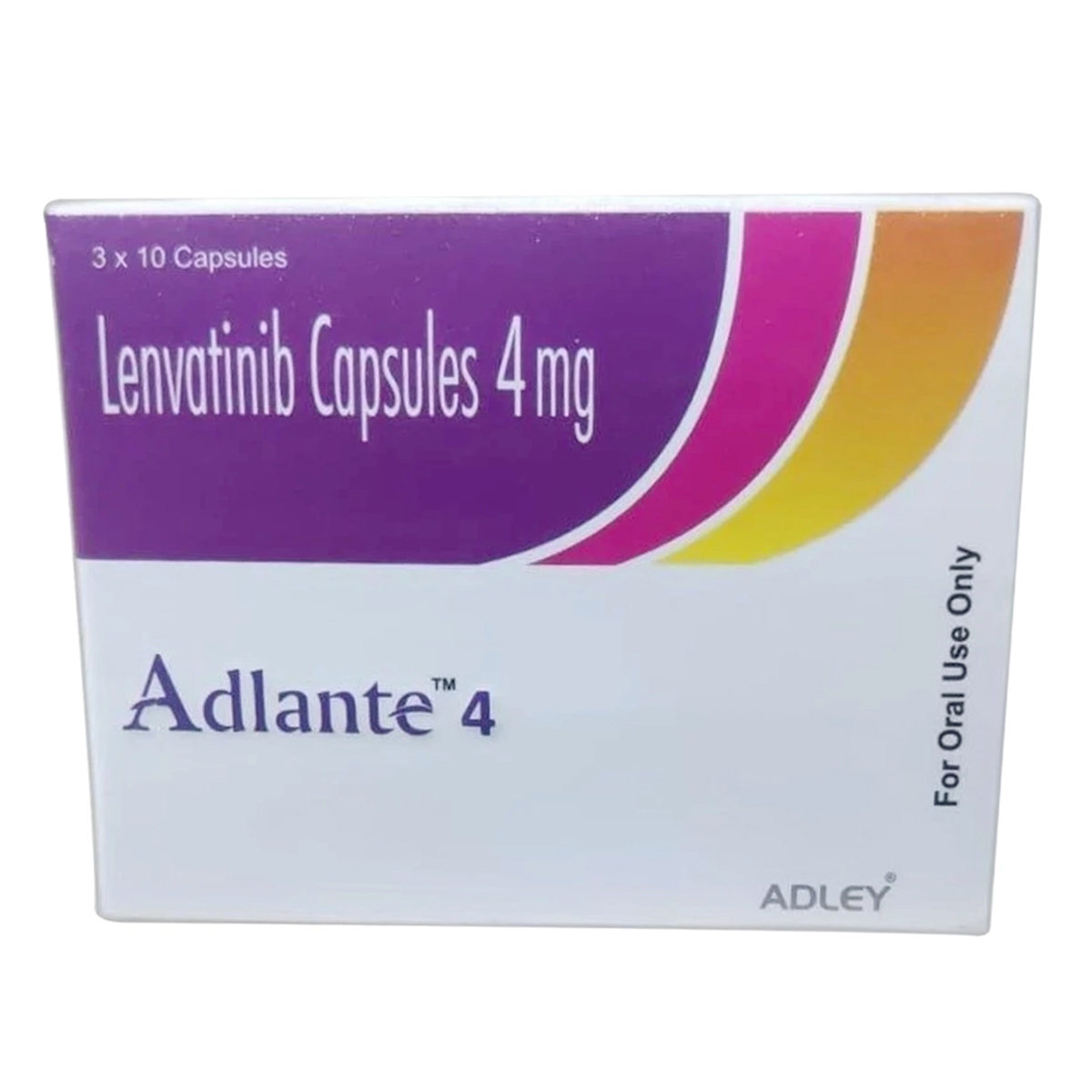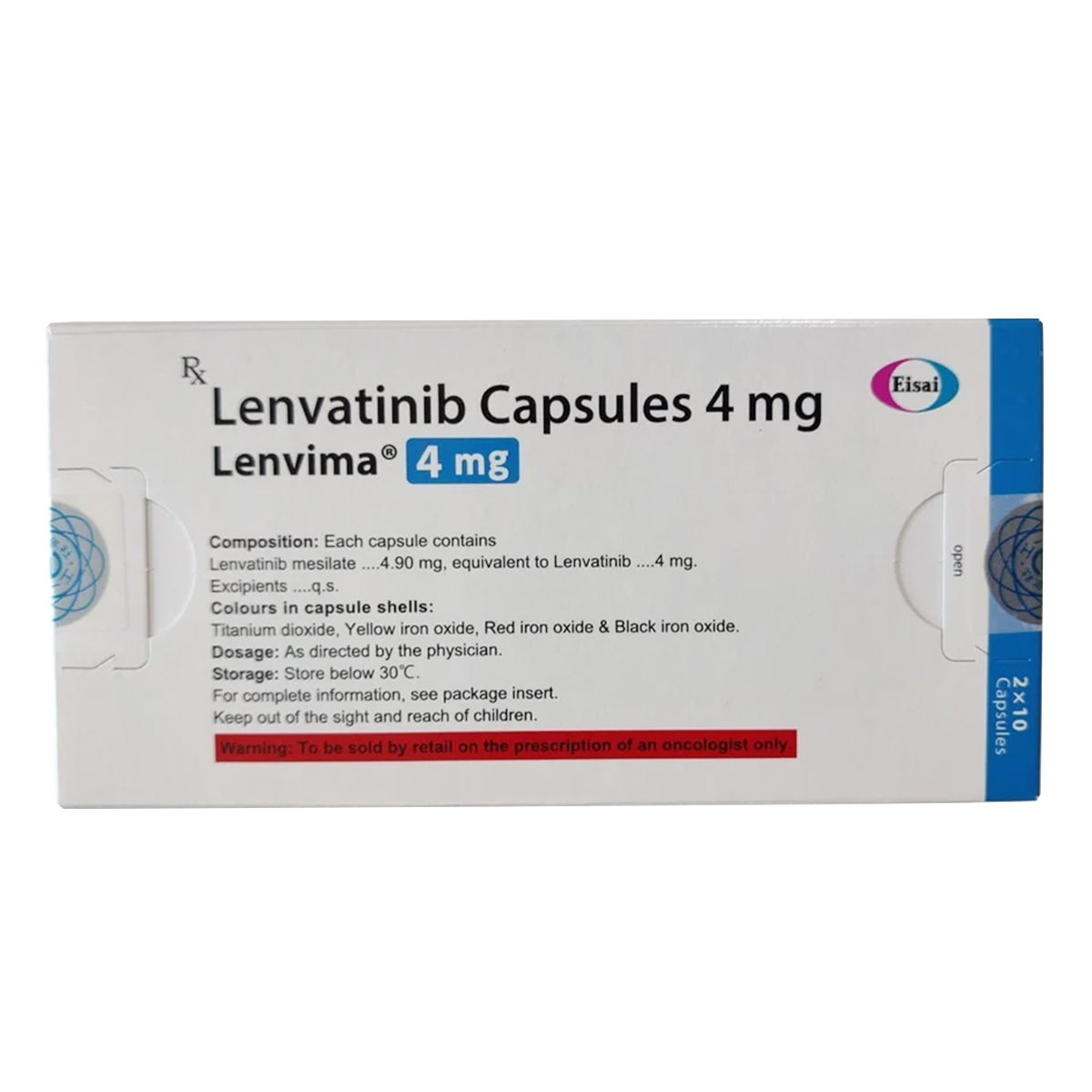Lenvatinib
About Lenvatinib
Lenvatinib is an anti-cancer medicine used in the treatment of various types of cancers. Cancer is a disease caused by the abnormal growth of cells that divide uncontrollably. This medicine is used in treating hepatocellular carcinoma as a first-line therapy, differentiated thyroid cancer in patients with locally recurrent or metastatic, progressive, radioactive iodine-refractory, advanced renal cell carcinoma in combination with pembrolizumab, and advanced endometrial cancer in combination with pembrolizumab.
Lenvatinib contains Lenvatinib, which belongs to the class of medicines known as kinase inhibitors. It works by inhibiting the action of an enzyme (tyrosine kinase) and thus stops the abnormal growth of cancer cells.
Lenvatinib may cause certain side effects such as diarrhoea, decreased appetite, nausea, vomiting, tiredness, itching, rash, headache, cough, abdominal pain, hoarseness, and dizziness. Inform your doctor if any of these side effects bother you. Lenvatinib should be taken as prescribed by your doctor. Do not take more than the recommended dose of medicine.
If you are allergic to Lenvatinib or its components, inform your doctor. Before taking Lenvatinib, inform your doctor if you have/had liver or kidney disease, calcium deficiency, heart problems, increased blood pressure, seizures, bleeding disorders, vision problems, and a history of blood clots. This medicine is known to cause embryo-fetal toxicity. It is not recommended for use in pregnancy and breastfeeding.
Uses of Lenvatinib
Medicinal Benefits
Lenvatinib contains Lenvatinib, which is used in treating different types of cancer. It works by stopping the action of a tyrosine kinase enzyme that causes the multiplication of cancerous cells. This helps stop the abnormal growth of cancer cells and thus reduce the further spread to other parts of the body. It also decreases the blood supply to cancer tumors to slow down the growth of the tumor. In this way, Lenvatinib stops the body's production, spread and growth of cancerous cells.
Directions for Use
Storage
Side Effects of Lenvatinib
- Nausea
- Vomiting
- Diarrhoea
- Loss of appetite
- Tiredness
- Muscle/joint pain
- Dizziness
- Weakness
- Cough
- Headache
- Itching
- Rash
- Decreased weight
- Abdominal pain
- Vision problem
Drug Warnings
To treat your condition effectually, continue taking Lenvatinib for the period that your doctor has prescribed. Avoid taking Lenvatinib if you are allergic to it or any other components present in it. Caution should be exercised if you have/had liver or kidney disease, any planned surgery, heart disease, stroke, blood or bleeding disorders, or gastrointestinal disorders. Inform your doctor if you are pregnant or are planning to become pregnant before starting the treatment, as this medicine is known to cause embryo-fetal toxicity. Breastfeeding should be discontinued in nursing mothers during the treatment as it passes into breast milk and may cause a possible risk to the infant. Avoid driving and operating machines, as this medicine may cause visual disturbances. This medicine is not recommended for use in children below 18 years of age as the safety and efficacy are not established. Lenvatinib may cause hypertension, thrombotic events, hemorrhagic events, hypothyroidism, gastrointestinal perforation and fistula, Reversible Posterior Leukoencephalopathy Syndrome (RPLS), elevated liver enzymes, kidney impairment, hypocalcemia, wound healing problems, and osteonecrosis in some patients. Hence, inform your doctor about your complete medication and medical history before taking Lenvatinib.
Drug Interactions
Drug-Drug Interactions: Lenvatinib may have interaction with antidepressants (escitalopram, citalopram), antiviral drugs (efavirenz, saquinavir), immunomodulatory medicine (teriflunomide), antibiotics (sparfloxacin, moxifloxacin), etc.
Drug-Food Interactions: Avoid alcohol consumption and smoking.
Dug-Disease Interactions: Tell your doctor if you have liver or kidney disease, heart problems, GI disorders, and eye problems before starting the treatment.
Drug-Drug Interactions Checker List:
Safety Advice

Alcohol
consult your doctorIt is unknown whether Lenvatinib interacts with alcohol. Consult your doctor.

Pregnancy
unsafeLenvatinib is not recommended for use in pregnancy as it may cause embryo-fetal toxicity and harm your foetus. Hence, if you are pregnant or planning pregnancy, inform your doctor before taking Lenvatinib. You should not become pregnant while you are taking Lenvatinib for at least 3o days from the last dose of Lenvatinib. Using effective birth control methods while on treatment with Lenvatinib is suggested.

Breast Feeding
unsafeInform your doctor if you are intending to breastfeed. Breastfeeding should be avoided while getting Lenvatinib and for one week from the final dosage of administration.

Driving
unsafeLenvatinib is known to cause dizziness and visual disturbances. Hence, avoid driving and operating machines until you are completely alert.

Liver
cautionIf you have a pre-existing or a history of liver problems, tell your doctor before taking this medicine. Notify your doctor if you notice any of the following symptoms: yellowing of your skin or whites of your eyes, fleeing drowsy, abdominal pain, dark-coloured urine, easier bleeding or bruising than usual. Your doctor may suggest tests to monitor your liver function while on treatment with this medicine.

Kidney
cautionIf you have a pre-existing or a history of kidney diseases, inform your doctor before taking Lenvatinib. It may cause kidney injury. Notify your doctor if you experience symptoms such as decreased urine output, blood in your urine, ankle edema, or lack of appetite.

Children
unsafeLenvatinib is not recommended for use in children, as the safety and efficacy have not been established.
Habit Forming
Diet & Lifestyle Advise
- Eat food rich in antioxidants such as berries, spinach, etc.
- Foods containing fibre help in better digestion. These include beans, peas, lentils, whole grains, nuts, and seeds.
- Physical activity helps strengthen muscles, reduces fatigue, helps in weight loss, and gives strength. Gentle activities like 20-30 minutes of walking or swimming would be helpful.
- Maintain a healthy weight by performing regular low-strain exercises and eating healthy food.
- Getting adequate sleep as resting helps improve your health and mental ability and improves attention.
- De-stress yourself by meditating, reading books, taking a warm bubble bath, or listening to soothing music.
- Avoid smoking and alcohol consumption.
- Maintain a healthy weight.
Special Advise
- Your doctor may suggest periodic liver function tests, kidney function tests, lung function tests and urine tests to monitor the function of the liver, kidney, lungs and the presence of protein in urine due to the use of Lenvatinib.
- Using contraceptive pills while using Lenvatinib to prevent pregnancy is advised.
- Thyroid function and adrenocorticotropic hormone levels will be monitored during treatment to avoid any life-threatening side effects.
- It is advised to use contraceptive pills while using Lenvatinib to prevent pregnancy.
- Seek medical attention immediately if you have swelling in your lower legs, fast heartbeats, or trouble breathing, as it may be a sign of a heart problem.
Patients Concern
Disease/Condition Glossary
Renal Cell Carcinoma: Also known as kidney cancer. It is the most common type of cancer seen in adults. This condition occurs when cancer/ malignant cells grow uncontrollably in the kidney and form a tumor. Advanced kidney cancer (metastatic renal cell carcinoma) occurs when the malignant cells spread to other parts of the body. Symptoms include red, orange, or pink-coloured urine due to the presence of blood in the urine.
Hepatocellular carcinoma: Also known as liver cancer. It occurs when the cancer/ malignant cells grow out of control. This infects the liver, destroys the liver cells and affects the ability of the liver to work properly. Symptoms may include abdominal pain, loss of appetite, weight loss, and pale bowel motions.
Differentiated Thyroid cancer: This condition occurs when the cancer cells grow abnormally in the thyroid gland. The thyroid gland is a butterfly-shaped organ present under the neck. This gland is useful in producing hormones responsible for the functioning of the body. Differentiated thyroid cancer is the most common type of thyroid carcinoma, which includes papillary thyroid cancer and follicular thyroid cancer.
Endometrial cancer: It is a cancer which affects the endometrium (lining of the womb or uterus). Symptoms may include bleeding between periods, pelvic pain, and pain during sexual intercourse. This cancer mostly occurs due to certain factors such as increasing age, obesity, never being pregnant, family history of cancer, and diabetes. It is usually seen in women above the age of 55 years. This condition is not life-threatening when it is diagnosed and treated in the early stages.
FAQs
Lenvatinib contains Lenvatinib, which works by inhibiting the action of a tyrosine kinase enzyme that causes the multiplication of cancerous cells.
It is advised not to miss any dose of medicine. If you miss it, take the medicine as soon as you remember. However, if it is time for your next dose, avoid taking the missed dose and do not double the dose.





